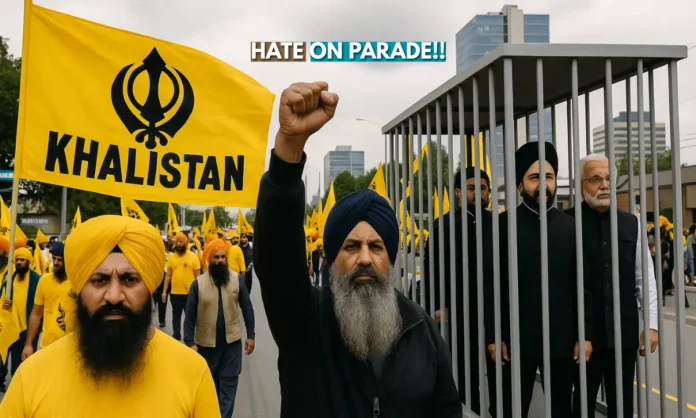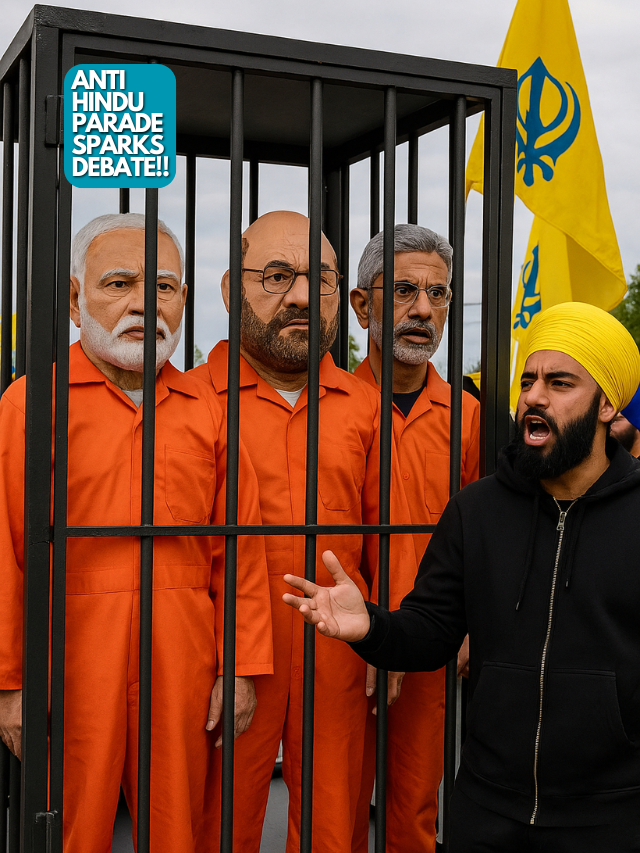SUMMARY
- Khalistani supporters in Toronto parade call for deportation of 800,000 Hindus and display effigies of top Indian leaders.
- Outrage grows as footage of anti-Hindu hatred, linked to extremist groups behind Air India bombing, goes viral.
- Canada’s political leadership under pressure to act decisively against foreign-funded hate movements amid rising tensions.
Anti-Hindu Extremism on Display: A Wake-Up Call from Canada
The streets of Toronto witnessed a deeply alarming spectacle: a Khalistani-organized parade that demanded the mass deportation of Hindus and showcased effigies of Indian leaders locked in a mock jail. This event at the Malton Gurdwara is not just another protest — it marks a dangerous escalation of ethno-religious hatred openly tolerated under the guise of free expression.
With memories of the 1985 Air India ‘Kanishka’ bombing still fresh in the global consciousness, the Hindu community and rights advocates are warning that Canada risks becoming a breeding ground for extremist ideologies once again.
Newly elected Prime Minister Mark Carney faces an immediate test of leadership: whether to confront this foreign-funded menace or allow history to repeat itself on Canadian soil.
#Pakistan & #Khalistan have now openly united in 🇨🇦: calling for violence against #India & demanding 800K Indo-Canadians leave the country.
— Ruchi Wali 🇨🇦 (@WaliRuchi) May 5, 2025
Yet Canadian media & politicians remain shamefully silent as our democracy becomes a platform for hate against another sovereign nation. pic.twitter.com/H4Dx9oGdTC
A Parade Crosses Into Hate Speech: How Khalistanis Stoked Anti-Hindu Sentiment
- Effigies of PM Modi, Amit Shah, and S. Jaishankar paraded in mock jail.
- Open calls for deportation of 800,000 Hindus shock Indian diaspora.
- Social media videos reveal widespread participation and glorification of extremist narratives.
In the now-viral footage, a massive truck-mounted mock jail bore the effigies of India’s Prime Minister and key ministers, while loudspeakers blared anti-Hindu slogans.
Organizers of the Malton Gurdwara parade crossed beyond political dissent into blatant communal hatred, demanding the removal of hundreds of thousands of Hindus from Canada.
Community leaders like Shawn Binda condemned the event, calling it “blatant anti-Hindu hatred by Khalistani terrorist groups.” The echoes of past violence, especially the Kanishka bombing that killed 329 people, loom large over these events, forcing many to question why Canada’s security agencies allowed this display to proceed.
Silence at the Top: Canada’s Leadership Faces Critical Test
- No condemnation issued by Prime Minister Mark Carney’s government yet.
- Rights groups warn against normalizing extremist displays.
- Critics say Trudeau-era tolerance toward Khalistani extremists persists under new leadership.
Despite the uproar, Canada’s political leadership, including Prime Minister Mark Carney, remained silent as of Monday.
Civil society organizations like the Coalition of Hindus of North America termed it a “shameful day” and demanded immediate intervention by local and federal authorities.
The Canadian media’s muted coverage and absence of condemnation from major political figures have triggered fears that hate-driven extremism is being normalized, especially when it targets minority communities like Hindus.
Journalists like Daniel Bordman questioned whether Canada’s new government will behave any differently from Justin Trudeau’s administration, which was often accused of appeasing Khalistani interests for electoral gains.
Khalistani Flags and Hate Posters: A Disturbing Pattern Emerges
- Recent Khalsa Day parades also featured “wanted” posters of Indian leaders.
- Rise in attacks on Hindu temples and Sikh gurdwaras with pro-Khalistan graffiti.
- Experts warn of increasing overlap between extremist ideologies and diaspora politics.
The Toronto hate parade follows a worrying trend: Khalistani supporters using cultural and religious events to push violent, separatist agendas.
Just weeks ago, at the Surrey Khalsa Day Vaisakhi Parade, posters branding Indian leaders as “wanted” were openly displayed.
The vandalism of Hindu temples and even Sikh gurdwaras with Khalistani graffiti further underscores how extremist narratives are seeping into public spaces.
Security analysts warn that if left unchecked, these hate campaigns could lead to communal violence within Canada and damage its reputation as a multicultural democracy committed to peace and inclusion.
A Dangerous Line Crossed: Can Canada Afford to Ignore Khalistani Extremism?
Canada today stands at a crossroads: what unfolded at the Malton Gurdwara was not legitimate political protest but an open celebration of communal hatred and ethnic cleansing rhetoric.
By allowing such displays to occur with impunity, Ottawa risks nurturing extremism that history has shown can have devastating consequences — for both the targeted communities and for Canada’s own social fabric.
If Prime Minister Carney’s government truly seeks to lead differently from the Trudeau era, decisive action against foreign-funded hate groups must begin now.
The world is watching — and history will not be kind to silence.



